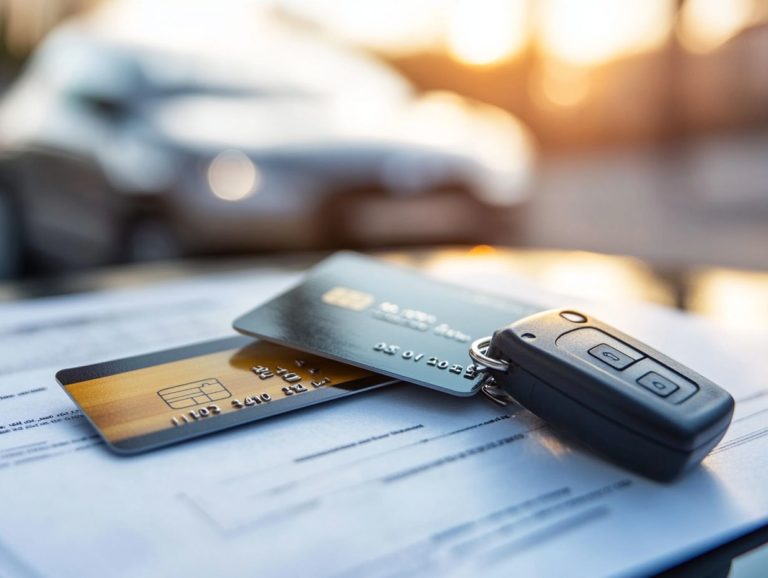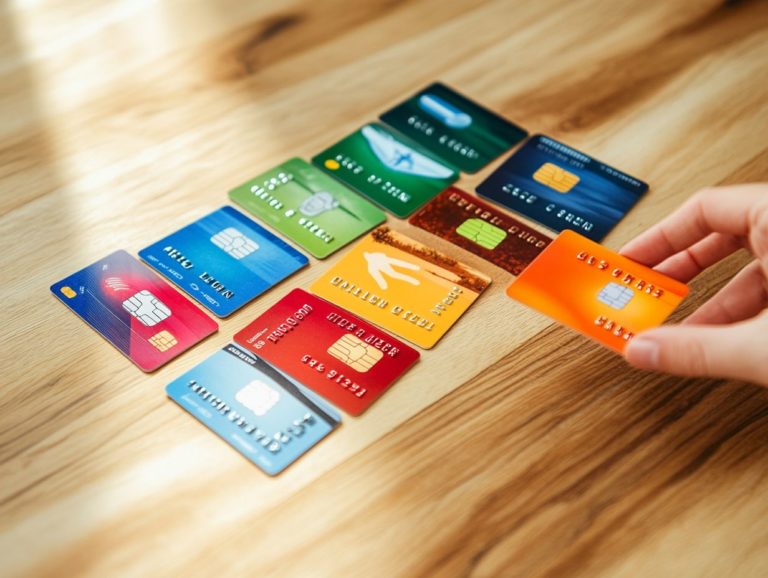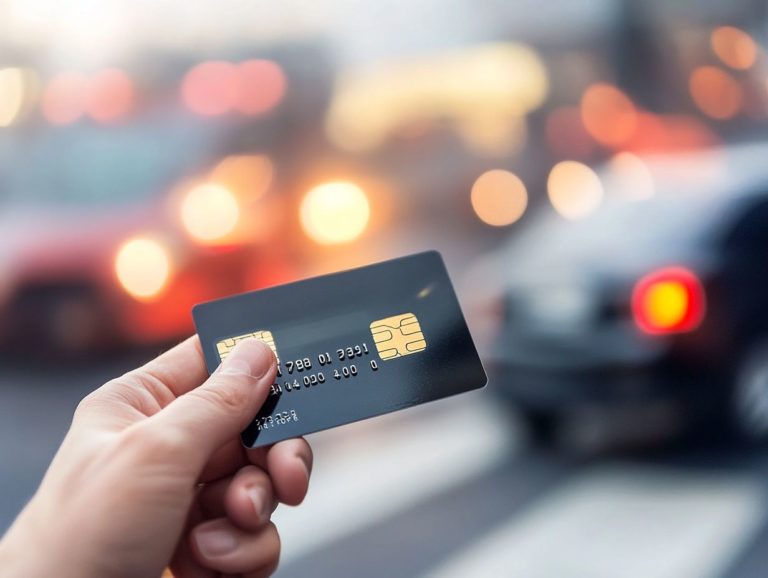Understanding Credit Card Fraud Protection
Credit card fraud is a major concern in today’s digital landscape, impacting millions of consumers annually. This article delves into the complexities of credit card fraud, covering its definition, various forms, and effective strategies for self-protection.
You ll discover how to spot suspicious activity and what immediate steps to take if you find yourself a victim. Additionally, you will learn about the array of protection services available to you. It s crucial to clarify your legal rights and responsibilities as a cardholder, empowering you to stay informed and protect your financial well-being.
Contents
- Key Takeaways:
- What is Credit Card Fraud?
- How to Protect Yourself from Credit Card Fraud
- Signs of Credit Card Fraud
- Steps to Take if You are a Victim
- Credit Card Fraud Protection Services
- Legal Rights and Responsibilities
- Frequently Asked Questions
- What is credit card fraud protection?
- How does credit card fraud protection work?
- What are some common types of credit card fraud?
- How can I protect myself from credit card fraud?
- Does credit card fraud protection guarantee 100% protection against fraud?
- Do I have to pay for credit card fraud protection?
Key Takeaways:
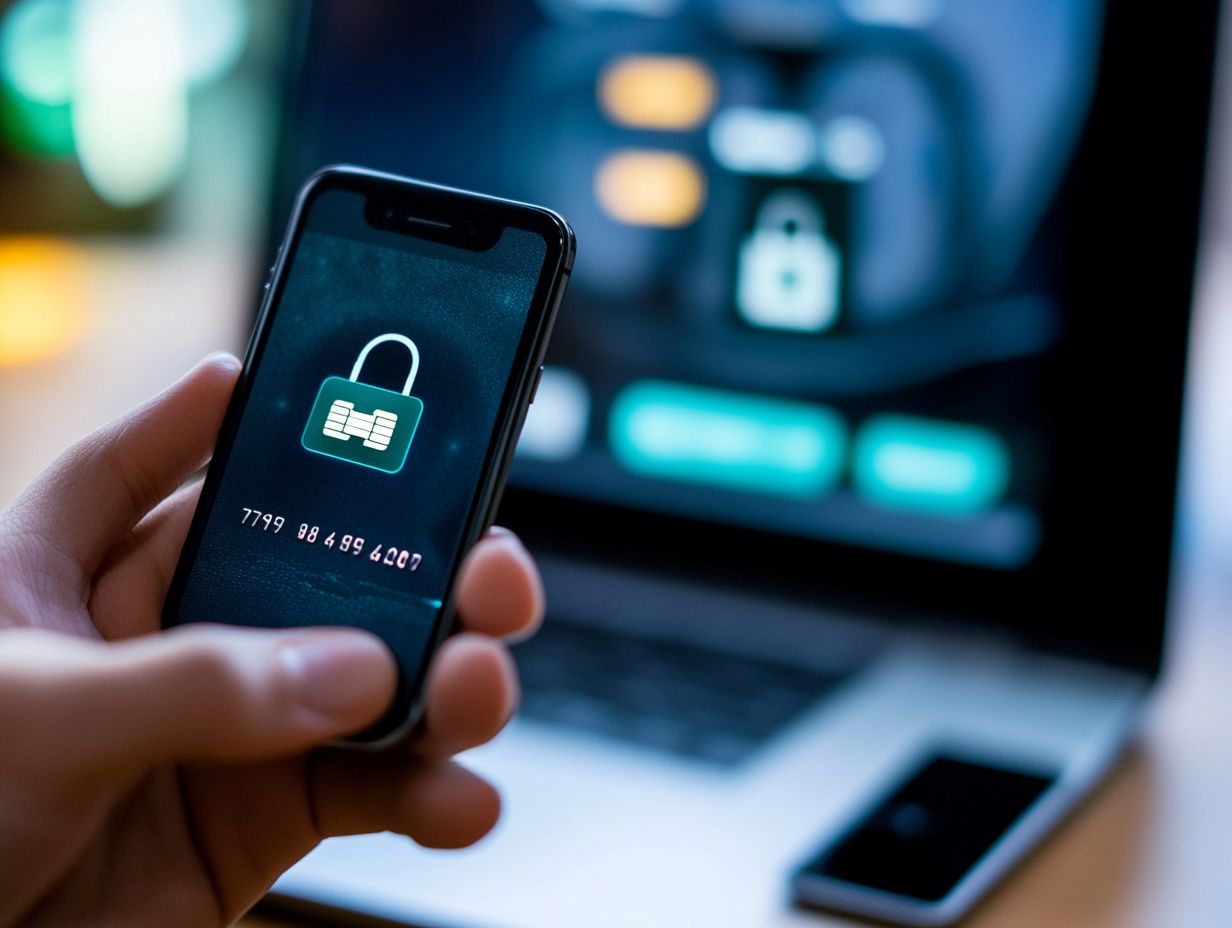
- Credit card fraud is a form of theft where someone uses your card information without your authorization. It can take various forms, such as identity theft, account takeover, and card-not-present fraud.
- To protect yourself from credit card fraud, regularly monitor your account, use secure websites for online purchases, and never share your card information with anyone. Set up fraud alerts and freeze your credit as additional precautions.
- Some signs of credit card fraud include unexpected charges and a sudden decrease in credit score. If you suspect fraud, report it to your bank immediately.
What is Credit Card Fraud?
Credit card fraud occurs when someone unauthorized uses another person s credit card information to make fraudulent purchases. This can result in substantial financial losses and potential identity theft.
This type of fraud takes many forms, including credit card skimming and phishing scams. Criminals also exploit stolen credit card data acquired through data breaches.
Major financial institutions like Mastercard, American Express, Discover, and Visa work tirelessly to combat these scams and safeguard consumers. Organizations like LifeLock collaborate with the FTC to provide solutions that monitor and secure your financial information.
Definition and Types of Fraud
Credit card fraud encompasses a variety of illegal actions that you should be aware of, including identity theft and unauthorized purchases.
These actions pose significant threats not just to individuals but also to financial institutions. Identity theft often begins with stolen personal information, leading to unauthorized purchases that can result in devastating financial consequences. In fact, in 2022 alone, credit card fraud resulted in a staggering $14 billion in losses for consumers in the United States.
Credit card application fraud is another concern, where criminals submit fake information to obtain cards in someone else’s name. This creates a ripple effect of financial distress. Financial institutions employ sophisticated computer programs and real-time monitoring to detect suspicious activities.
Meanwhile, credit bureaus provide you with tools to track your credit history, serving a dual purpose of protection and awareness in this escalating battle against fraud.
How to Protect Yourself from Credit Card Fraud
Protecting yourself from credit card fraud requires vigilance, secure online practices, and proactive measures to monitor your accounts, including understanding credit card consumer protections.
By using secure websites for your online purchases and staying attentive to your financial information, you can significantly lower the risk of unauthorized transactions.
Act now and consider services like LifeLock Ultimate Plus, which provide comprehensive identity theft protection. These services will ensure your personal information is shielded from the ever-evolving threats in today s digital landscape.
Take charge of your financial safety today!
Best Practices for Prevention
Implementing best practices to prevent credit card fraud can significantly enhance your defense against scams, including phishing and credit card skimming.
To stay ahead of these threats, secure your personal information by using complex passwords and enabling two-step verification on your financial accounts. This process adds an extra layer of security by requiring a second form of identification.
Being cautious about suspicious emails is vital. Pay special attention to any requests for sensitive information, as they can effectively thwart phishing attempts aimed at stealing your credentials.
Shredding sensitive documents before disposal is also important. This prevents dumpster diving, a common tactic used by fraudsters to access personal data.
If your cards are lost or stolen, reporting them immediately allows for prompt action. This reduces the risk of unauthorized transactions and minimizes any financial losses.
Signs of Credit Card Fraud
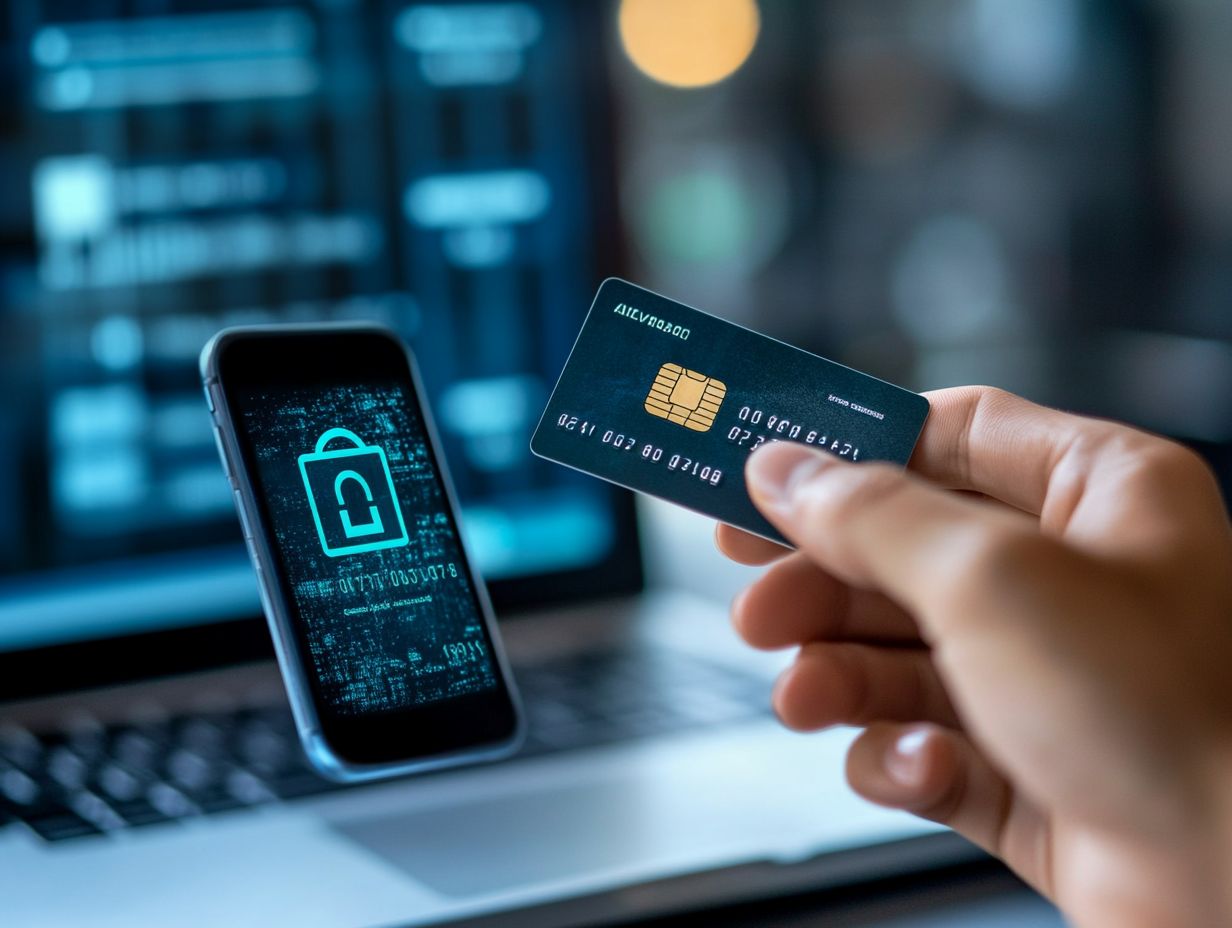
Recognizing the signs of credit card fraud is essential for prompt intervention. Keep an eye out for common indicators like suspicious charges on your accounts or unexpected payments from unfamiliar locations.
New accounts opened in your name without consent are also red flags. By maintaining vigilance over your credit card statements, you can spot these warning signs early.
This enables you to take swift action to mitigate any potential damage.
Identifying Suspicious Activity
Identifying suspicious activity on your credit card accounts is crucial in the ongoing fight against credit card fraud and identity theft.
To enhance your ability to detect discrepancies, set up alerts for every transaction. This allows you to receive notifications for purchases and spot unauthorized charges swiftly.
Regularly reviewing your statements helps you track spending patterns. Notice any irregularities or unusual transaction locations as potential fraud indicators.
Recognizing these patterns is vital. Promptly report any suspicious activity to your card issuer to ensure a swift response.
Steps to Take if You are a Victim
If you fall victim to credit card fraud, act quickly to mitigate financial damage. Begin by notifying your financial institution and the FTC.
This ensures that your accounts are fortified against further unauthorized access. Keep meticulous records of all communications and transactions related to the fraud.
This information will be invaluable in resolving the situation and may assist you in recovering any lost funds.
Reporting and Resolving Fraudulent Charges
Reporting and resolving fraudulent charges is crucial for anyone who has faced credit card fraud. This action safeguards your financial interests and helps prevent further unauthorized purchases.
By promptly notifying your financial institution, you initiate a process to trace and rectify these disputes. Gather and provide necessary documentation, such as transaction records, statements, and any written communication with your bank.
Under federal law, you have specific rights that enable you to contest charges, limiting your liability for unauthorized transactions. If issues remain unresolved, consider escalating the matter by reaching out to the Consumer Financial Protection Bureau or the Federal Trade Commission.
Credit Card Fraud Protection Services
Credit card fraud protection services, like LifeLock Ultimate Plus, offer critical tools to safeguard your financial well-being and shield yourself against identity theft. These services provide comprehensive credit monitoring to help you remain vigilant against unauthorized activity on your credit accounts.
This ensures that any discrepancies are identified promptly.
Options for Additional Protection
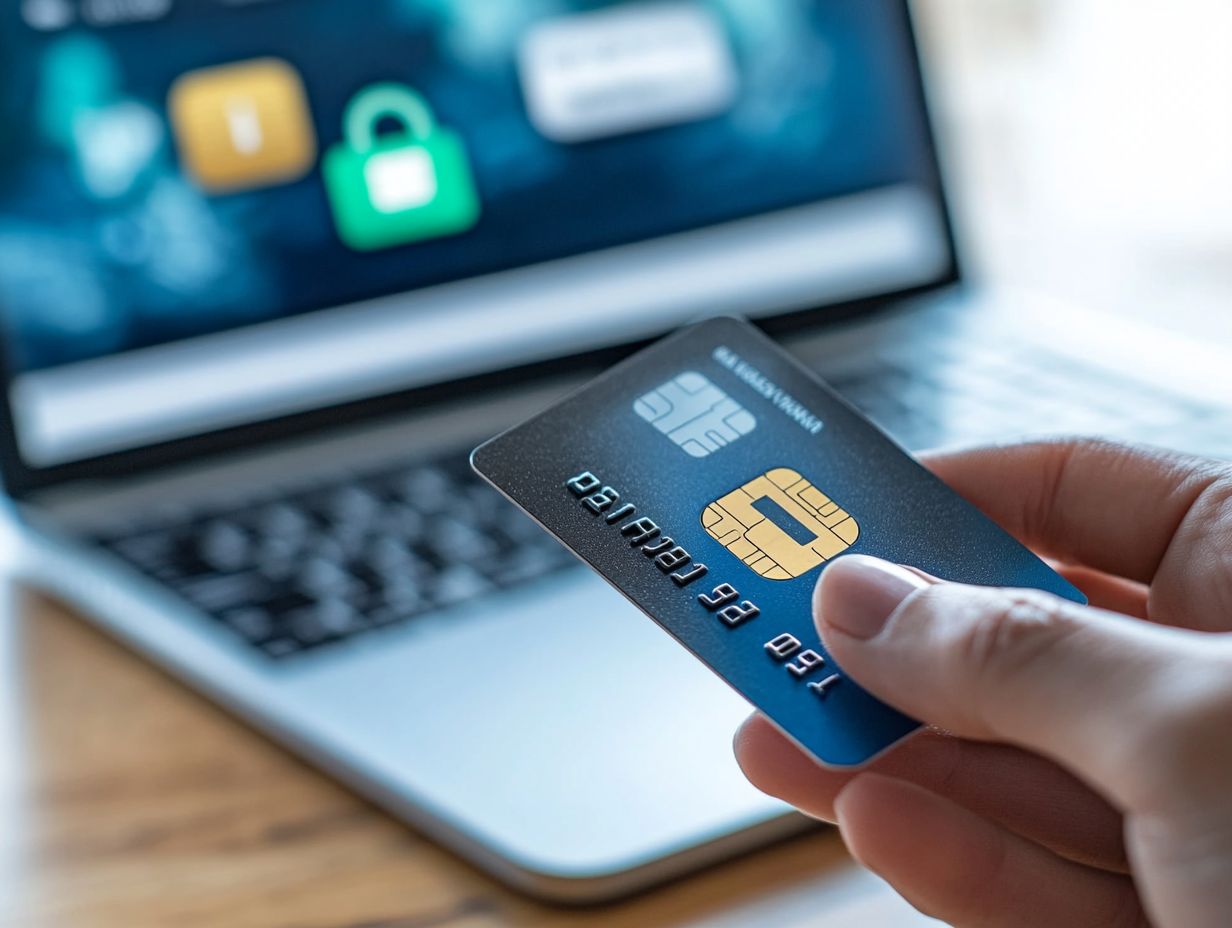
Exploring options for additional protection against credit card fraud, such as understanding what a credit card fraud alert is, is essential for enhancing your financial security and safeguarding personal information.
Incorporating identity theft insurance provides peace of mind, knowing you have a support system in place to recover losses from unauthorized transactions.
Initiating fraud alerts prompts potential creditors to verify your identity before approving new accounts.
It s crucial to adopt secure browsing practices, like using VPNs tools that keep your internet connection secure and ensuring websites are encrypted to minimize exposure to online threats.
Many financial institutions team up with fraud protection services for a comprehensive approach that helps navigate and prevent potential risks, ensuring a secure financial landscape.
Legal Rights and Responsibilities
You need to know your legal rights and responsibilities as a cardholder. This knowledge safeguards you against financial loss and clarifies your protections under the law.
Organizations like the FTC offer guidelines on liability for unauthorized transactions.
Credit bureaus monitor your credit report for irregularities, keeping you informed and protected.
Understanding Your Rights and Responsibilities as a Cardholder
As a cardholder, grasping your rights and responsibilities regarding credit card fraud is crucial for protecting your financial health and ensuring compliance with FTC regulations.
This understanding helps you defend against unauthorized transactions while clarifying the limits of liability.
When a fraudulent charge appears on your statement, report it promptly to reduce responsibility, typically capping your losses at just $50 if you act quickly.
Maintaining rigorous account security through robust passwords and regular monitoring acts as your first line of defense.
Keeping a close watch on your credit reports is essential; this vigilance safeguards your overall financial well-being.
Frequently Asked Questions
What is credit card fraud protection?
Credit card fraud protection is a security measure by credit card companies to prevent unauthorized use of a cardholder’s credit card information, including important aspects covered in understanding credit card loss and theft protections.
How does credit card fraud protection work?
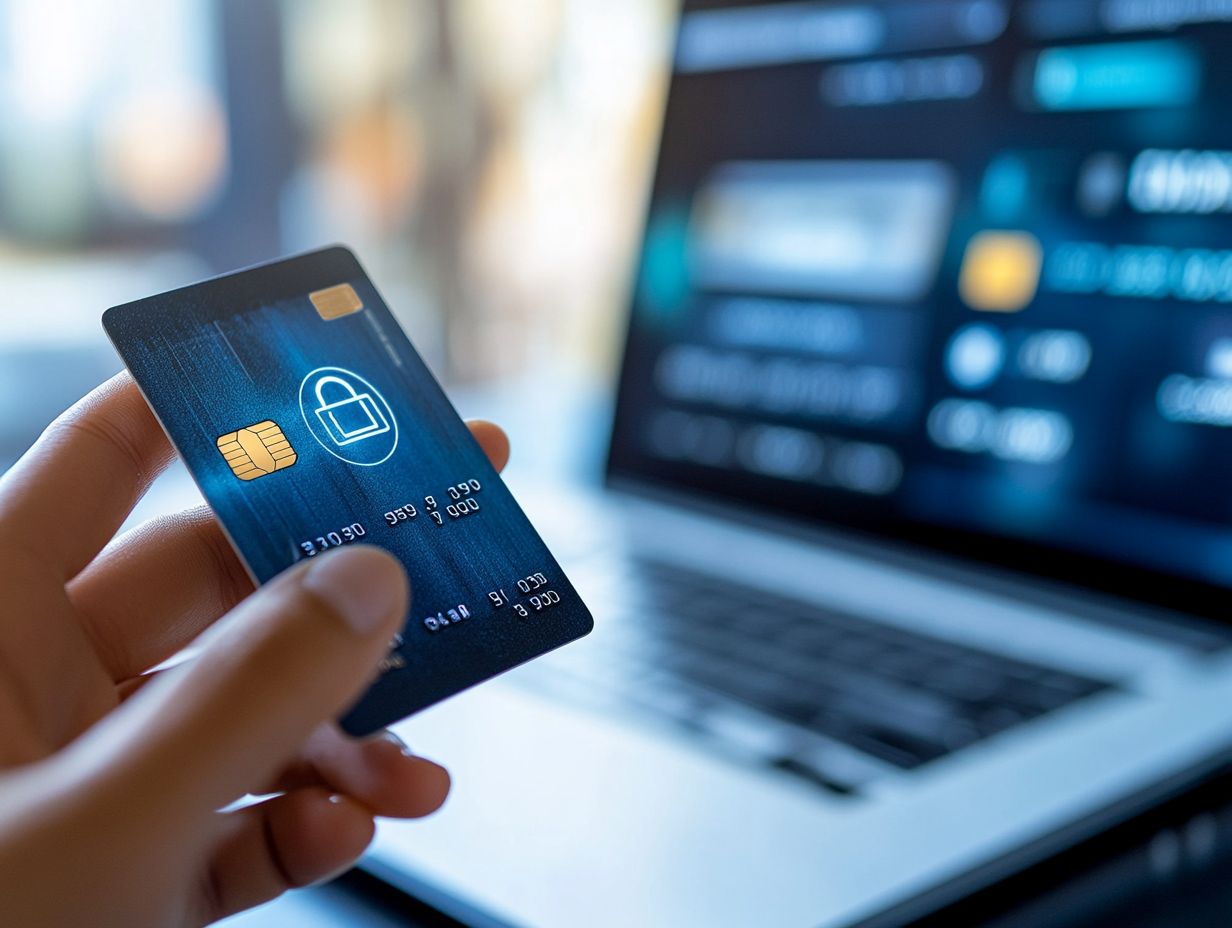
It uses advanced technology to detect and prevent fraudulent transactions, including real-time monitoring, fraud alerts, and verification processes.
What are some common types of credit card fraud?
Common types of credit card fraud include identity theft, account takeover, and skimming methods that involve obtaining someone’s credit card information and using it for unauthorized purchases.
How can I protect myself from credit card fraud?
To protect yourself, monitor your credit card statements carefully and report any suspicious activity immediately. Enable fraud alerts on your account and use secure online shopping practices.
Does credit card fraud protection guarantee 100% protection against fraud?
No, it cannot guarantee 100% protection. However, it can significantly reduce the chances of fraudulent activity and provide additional security and peace of mind.
Do I have to pay for credit card fraud protection?
It is typically provided by credit card companies as a complimentary service. Some companies may offer additional protection for a fee, so review your credit card agreement to understand included protections and any associated costs.
Start safeguarding your financial information today!

